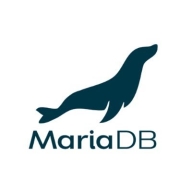

MySQL and MariaDB are both contenders in the open-source database category. MariaDB holds an edge by offering improved performance and innovative features over MySQL in community-driven environments.
Features: MySQL is recognized for its multi-threaded architecture, compatibility with LAMP/WAMP stacks, and advanced features like replication and stored procedures, making it suitable for small to medium applications. MariaDB enhances performance with features like Galera Cluster for multi-master replication, offers better query optimization, and is appreciated for its community-driven innovations.
Room for Improvement: MySQL faces challenges with the complexity of InnoDB, weaker replication capabilities, and limited transactional support in MyISAM. MariaDB, although generally faster, struggles with long, complex queries and shows instability in some configurations. MySQL aims to improve transaction efficiency, while MariaDB focuses on flexible clustering and stability.
Ease of Deployment and Customer Service: Both MySQL and MariaDB offer flexible deployment options across on-premises and cloud environments. MySQL integrates seamlessly in LAMP stacks, while MariaDB excels in hybrid setups thanks to enhancements over MySQL. Each product benefits from community support, but structured commercial support is stronger under Oracle for MySQL, whereas MariaDB offers optional paid assistance alongside community-driven support.
Pricing and ROI: MySQL is free under a GPL license, with enterprise editions requiring a commercial license, appealing to startups for its affordability. MariaDB, along with its community version being free, offers commercial licenses and subscriptions for enhanced features and support. Both deliver strong ROI due to their robust performance without significant upfront costs, with MariaDB's affordability and flexibility increasingly appealing to enterprises.
Compared to MongoDB, there are some platform deficiencies, but the support team shouldn't bear that burden.
We have no issues and usually receive timely responses.
Meeting scalability requirements through cloud computing is an expensive affair.
We haven't found issues with the stability of MariaDB.
We face certain integration issues, especially when we integrate the database with security solutions like IBM QRadar.
MariaDB is scalable and easy to scale.
The load balancer, MySQL LB, which is used to connect to the application, lacks clear documentation.
It could be more beneficial if MySQL can enhance its data masking functionality in the same way it has improved data encryption.
Oracle could improve on scalability.
MariaDB is in the pricey range, especially for huge databases handling terabytes of data.
Oracle has different components, so if you need security, you have to procure a different license, but here everything is inbuilt and it's not costly.
Configuration, setup, and schema design are good features in MariaDB.
With Oracle, we have to buy another solution for encryption and masking, but MySQL supports native encryption, which enhances our return on investment.
It's an inbuilt feature of the database itself, and you don't have to purchase an additional license for the replication.
It allows programming, writing stored procedures, creating views, constraints, and triggers easily.
| Product | Market Share (%) |
|---|---|
| MySQL | 8.9% |
| MariaDB | 6.7% |
| Other | 84.4% |


| Company Size | Count |
|---|---|
| Small Business | 27 |
| Midsize Enterprise | 12 |
| Large Enterprise | 25 |
| Company Size | Count |
|---|---|
| Small Business | 73 |
| Midsize Enterprise | 31 |
| Large Enterprise | 61 |
MariaDB is an open source relational database created by the original founders of MySQL. It is considered one of the most popular and trusted database servers throughout the world. MariaDB is a valued component found in most cloud offerings and is the default in many Linux tools. It is also widely used by Wikipedia, WordPress, and Google, among other well-known sites. Maria DB easily melds data into concise information from a vast array of applications, such as banking, online shopping, websites, and more.
MariaDB was originally created to improve MySQL performance. It is the most widely chosen database server due to the solution being super fast, robust, user-friendly, and easily scalable. MariaDB also offers a substantial ecosystem of plugins, storage engines, and numerous other valuable tools that make it very attractive for a significant offering of use cases.
The solution’s newest functionalities include compatibility with Oracle Database and Temporal Data Tables, and advanced clustering with Galera Cluster 4, which make it easier for users to research data history from any point in the past. Additionally, the most recent versions include JSON and GIS features. MariaDB is committed to staying an open source solution.
MariaDB Features
Reviews from Real Users
Faustine C., Engineering Supervisor- Corporate Data Solutions and Services at TZ Telecoms Corporation, shares, “The software provides a lot of information on what is happening inside the database. For most performance parameters it is easy to know if something is not right in the configuration or optimization which helps engineers take remedial fine-tuning measures. For example, if the database is underperforming it is easy to know which performance parameter can be adjusted to handle the workload. It is difficult to troubleshoot database issues if many performance parameters can not be monitored or debugged which is the case with some database management systems. It provides great monitoring of data storage, processing, and performance stability which is really important for real-time data storage and processing. It's a user-friendly product.”
A PeerSpot user who is a Senior Engineer at a tech services company relates, “ The solution's high availability is its most valuable aspect. We have found the product to be stable and the initial setup is pretty simple. I'd rate the solution at a ten out of ten. I'm very happy with it overall. I would recommend the solution to others. It's easy to find details about the product online and to learn about it.”
MySQL is an open-source database known for its ease of use and high performance. It offers features like replication and clustering, making it ideal for diverse applications. Its cost-effectiveness and LAMP integration are key advantages for businesses.
MySQL supports a variety of languages and platforms, providing reliable, scalable data management. Its graphical interface and LAMP architecture integration enhance its usability, while community support further strengthens its appeal. Challenges include scalability issues with large databases, lack of advanced clustering, and limited high-availability features. Complex queries may affect performance, and integration can pose difficulties. The outdated interface and insufficient documentation are also concerns, along with replication and backup reliability issues.
What are MySQL's key features?MySQL is widely implemented in industries such as web development, e-commerce, and finance. It's used for managing dynamic websites, powering e-commerce platforms, and supporting financial applications. Its compatibility with PHP and cost-effectiveness make it suitable for CMS platforms like WordPress. With cloud services integration, MySQL is a backend choice for scalable applications in various sectors.
We monitor all Open Source Databases reviews to prevent fraudulent reviews and keep review quality high. We do not post reviews by company employees or direct competitors. We validate each review for authenticity via cross-reference with LinkedIn, and personal follow-up with the reviewer when necessary.